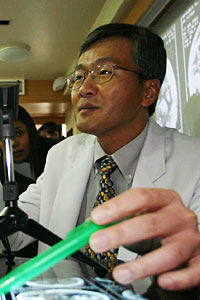
Even though positioning Thailand as a medical hub of Asean, as promoted by this and previous governments, has brought about rising income in the healthcare industry from inbound medical tourism, the downside of this trend has been more obvious in recent years.
The internationalisation of a number of private hospitals, mainly catering to the needs of international patients, means higher fees for medical treatment, care and services. Unfortunately, the trend has triggered a wave of copycat hikes among most private hospitals, the majority of whose customers are Thais.
The copycat increases are unreasonable and out of control, placing an unexpected financial burden on both middle-class Thais, who in the past found treatment and care at average private hospitals affordable, and at state-run hospitals.
Capitalising on the growing popularity of Thai healthcare services among foreign patients, the government is eyeing an increase in the number of inbound medical tourists to two million a year.
Such a policy, without a doubt, will raise the international profile of the country's healthcare industry and its medical professionals. On the bright side, it has boosted revenue, now as much as 100 billion baht a year. The less pleasant reality is that the increase in revenue will mainly benefit a handful of owners and shareholders of listed private hospitals who have continued their quest to take over a number of medium-sized private hospitals and consequently internationalise their price structures.
However, other small- and medium-sized private hospitals, whose customers are mostly Thais, have become copycats of those "international" price setters, imposing increasingly high medical charges and fees.
For example, these hospitals set two prices for the same medicine: one price for inpatients and another for outpatients. The former end up paying more.
Moreover, these private hospitals also increase drug prices unreasonably by as much as 30%. The burden is high on their customers if the hike is applied to expensive medicines. Changes to their medical charges have been made without factoring in related cost of living, inflation and interest rates. The price hikes have forced Thai patients, whose income levels are much lower than those of expatriates in Thailand or medical tourists, to bear unexpectedly high medical costs. Most have no private health insurance and usually pay out of their own pockets.
The current economic downturn has worsened the situation. This group of patients no longer finds the same hospitals affordable. The rising costs have forced one-third of outpatients to opt out from paying for medicines directly to the hospitals they are admitted to. Alternatively, they ask their doctors to write them drug prescriptions so that they can buy the prescribed medicines at drug stores where the prices are 50% cheaper.
Worse still, if they are told to admit themselves as inpatients, they usually opt out and ask for a transfer to a state-owned hospital.
The trend has also affected state-owned hospitals now servicing more patients under the same limited financial and human resources. Today, we are seeing longer queues of patients waiting for their turn to see a doctor or get treatment at state hospitals. It is not a good thing for those put on a long waiting list for a bed or a room. Budgets allocated to these state hospitals each year therefore are insufficient as they shoulder a heavier burden.
The plights of state hospitals and Thai patients needs intervention by the Ministry of Public Health which must impose ceilings on private hospitals' fees and charges, focusing on those where the majority of patients are Thais.
Meanwhile, the ministry does not have to go as far as regulating the pricing of "international" private hospitals the majority of whose customers are foreigners. They should be allowed to continue setting their own prices as long as their services cater to the needs of international patients.
This is the same logic that the Ministry of Education applies to education fees charged by international schools in Thailand where the majority of their students are foreigners. Thai parents who want to enrol their kids in an international school can do so at their own expense. The ministry does not apply price control on these international schools but put ceilings on fees of other private schools where the enrolled students are Thais.
"International hospitals" are known for their high healthcare charges because their main consumer groups are international patients who can afford the high costs and still find them cheaper than what they would have paid at home.
Thai patients who prefer convenience can opt for these international premises as long as they can afford them -- the same as those sending their kids to international schools.
For private hospitals whose incomes are mainly derived from Thai patients, their business approaches to medical treatment and services should not merely aim to maximise benefits for their shareholders.
They should demonstrate compassion for their patients and aim for moderate profits.
It is about time the government imposes price control measures on these hospitals to ensure Thai patients are not ripped off and find medical costs at non-internationalised premises affordable.
Manoon Leechawengwongs is a medical doctor with over 40 years of experience of working in Thailand and the United States.
